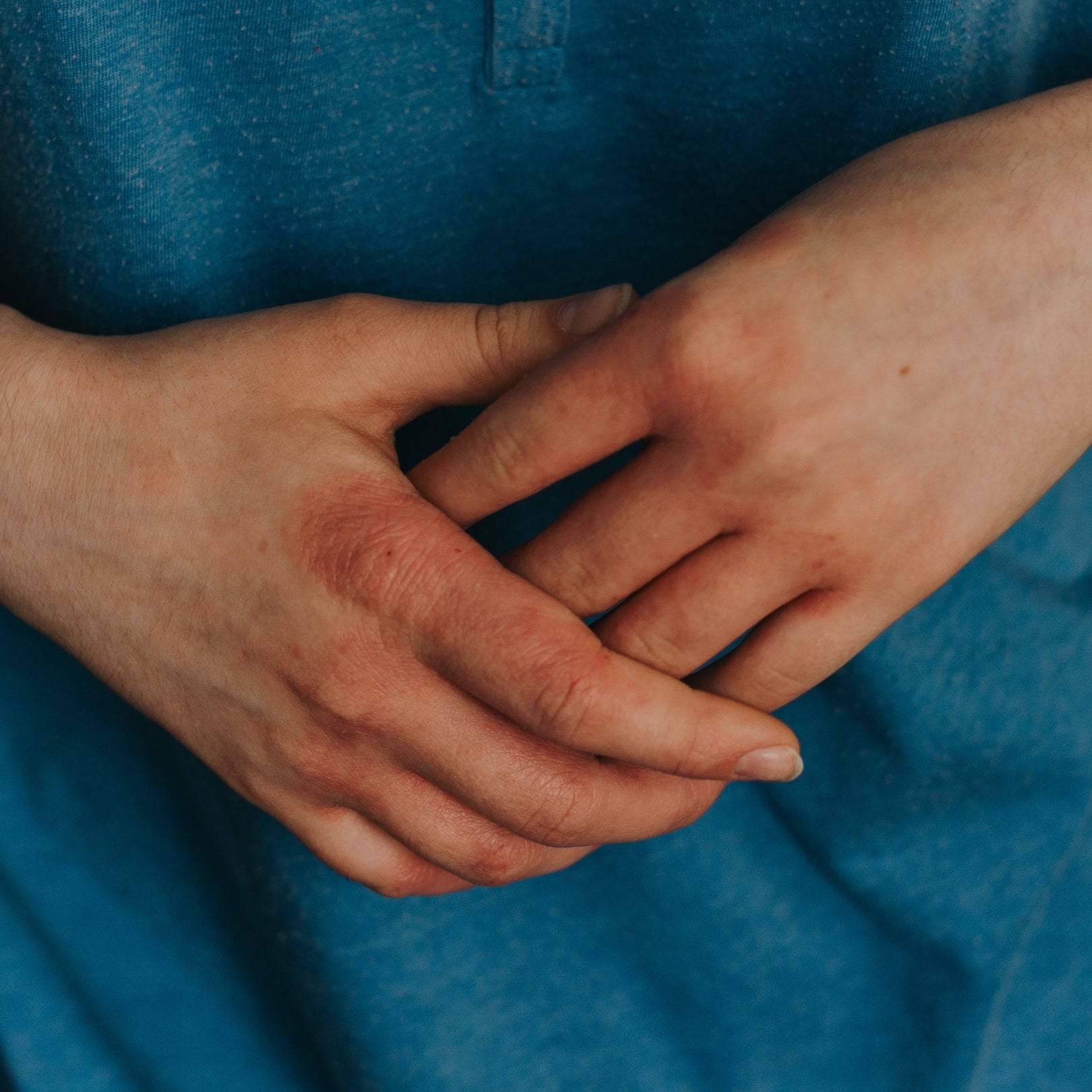What is atopic eczema (or Atopic Dermatitis)? "Atopic" eczema, which often runs in families, is a condition that causes excess inflammation of the skin. Atopic Dermatitis (AD) is a disease that causes inflamed, itchy skin. It typically affects the insides of the elbows, backs of the knees, and the face, but can cover most of the body. Even though most people with atopic eczema have a family member with a similar problem, approximately 20 percent of those suffering from atopic eczema may be the only one in their family bothered by this condition.
Often the problem fades by the time people reach their teen years, some people with AD have a lifelong tendency to have:
Dry skin—easily irritated
Occupational skin disease—hand dermatitis or skin rashes
Eye problems—eyelid dermatitis, cataracts
Family and social relationships disrupted
AD is a very common disease, present worldwide, though it is more common in urban areas and developed countries. An estimated 10% of all people are at some time affected by AD (may not apply in the tropics.) It affects men and women of all races equally. Eczema in children is also very common. Although the term eczema is often used for atopic dermatitis, there are several other skin diseases that are eczemas as well, including:
atopic dermatitis
seborrheic dermatitis
nummular eczema
irritant contact dermatitis
dishydrotic eczema
allergic contact dermatitis
All types of eczema cause itching and redness, and some will blister, weep, or peel. AD tends to flare-up when the person is exposed to certain trigger factors. These substances or conditions worsen the dermatitis, such as dry skin, irritants, allergens, emotional stress, heat and sweating, and infections.
Allergens are more subtle trigger factors. An allergen does not irritate but may trigger an AD flare-up in those who have become allergic to it from prior exposure. Allergens are usually animal or vegetable proteins from foods, pollens, or pets. Many older AD children and adults recognize a relationship between stressful occurrences in their lives and their AD flare-ups. Anger, frustration, and embarrassment all may cause flushing and itching. The resultant scratching can cascade into perpetuating dermatitis.
Additionally, extreme cold or hot temperatures, or sudden changes in the temperature, are poorly tolerated by persons with AD. The best line of defense against AD is prevention. At the very outset of the beginning of a flare up, prompt eczema treatment with Eczema Control or other medication as directed by a physician is important.
There is no such thing as an eczema cure, but a lot can be done to alleviate the symptoms. Cortisone (steroid) creams applied directly to the affected area are a mainstay of therapy. However, overuse of highly potent steroids can be damaging. Cortisone pills or shots are also a common treatment for eczema, but they are often not safe for long-term use. Tar baths, antihistamines, and antibiotics are often used, but these, too, meet with limited success. Home remedies for eczema, such as vitamins, mineral or nutritional supplements, do not seem to work. The same is true of a modified eczema diet, which usually consists of avoiding certain foods and increasing your consumption of certain nutrients.
AD sufferers always have very dry, brittle skin. The external layer of the skin, called the stratum corneum, acts as a protective barrier. When the stratum corneum cracks because of dryness, irritants can reach the sensitive layers below and cause a flare-up of AD. Using an eczema cream or moisturizer can help prevent dry skin. However, it is important to find a moisturizer which is transdermal and can safely penetrate the cell membranes.
The certified organic oils and extracts in Eczema Control moisturize the skin, making it flexible and less likely to crack. The triple unsaturated fatty acids in Eczema Control help strengthen cell membranes and assist to keep the skin moisturized.
Research has found that effective moisturizers are ointment bases with these triple unsaturated fatty acids. Lotions contain water and alcohol which can dry the skin and are usually inadequate to treat dry skin from eczema. Therefore, Eczema Control contains no water or alcohol and is effective to heal damages skin.
People with AD are prone to skin infection. In general, infections are hard to prevent but should be treated promptly to avoid aggravating the AD. It is important that persons with AD, or their parents, learn to recognize the early signs of skin infections and treat the condition immediately. Sometimes viral illnesses such as colds or flu cause AD flare-ups. To stop the problem from getting worse, people with AD should take extra care of their skin while the virus runs its course. People with AD do not have to be limited by their disease. It can be controlled and treated with Eczema Control

Atopic Eczema (Atopic Dermatitis)
By Dr. Peter Klapper Ph.D.

